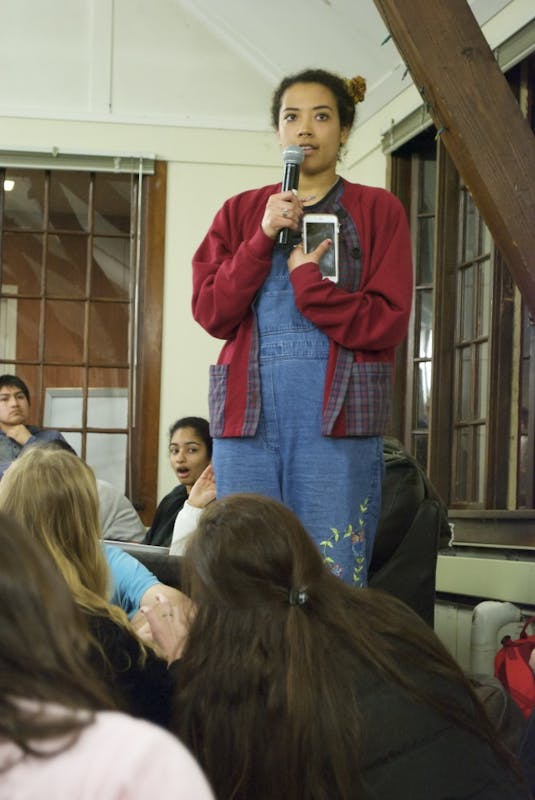“This system also cannot continue if it expects people who look like me to participate in it marginally. I participate in a system that allows me to be seen, but not heard.”
This feeling — expressed by Afro-Latina freshman Carolina Martinez-Sanchez — was shared by many at Tuesday night’s event “Continuing the Conversation on Racial Inclusion,” where nearly 200 students, professors and administrators packed St. Mary’s for a student-led, open-mic conversation on diversity and inclusion (or the lack thereof) on The Bluff.
The event was organized by Black Lives Matter @UP in response to the Panel on Racial Inclusion on March 22, organized by the Presidential Advisory Committee on Inclusion, where all the featured speakers were white and many students felt diverse perspectives were ignored.
“UP wants to show our faces on media, posters, websites, and wants our diversity in the classroom, but you don’t want to hear our voices to affect or influence the decisions made,” Martinez-Sanchez said. “The first event on inclusion was marginalizing in that you want us to come to an event and not one of us is represented in voice. If I have a comment or a story to share, which I did, the response was ‘please write it down on a feedback sheet and we’ll get back to you.’ Isn’t that the total opposite of inclusion right there?”
“Continuing the Conversation” allowed for students of color to share their personal experiences regarding racism on campus.

Many students expressed surprise with the lack of students of color upon their arrival on campus despite misleading advertisements and frustration with actions that University administration has taken, such as advertising the University as having more diversity than it does.
“When I first came to UP, I was so excited ... Right before my first class started, I realized that I was the only student of color in a class of 30,” freshman Lydia Heye said. “I thought, maybe it’s just this class? I repeated that to myself in all six of my classes ... I want to say that my university puts diversity as one of its highest priorities, and I want to say that I feel 100 percent comfortable as a student of color here at the University of Portland.”
Sophomore Muhammed Acar also expressed the difficulty of finding a place at UP.
“When I first transferred to UP, I thought it was very hard to fit in since I couldn’t really associate myself with any of the students around here,” Acar said. “It was hard to go to class. It was hard going to class and realizing you’re the only one with different hair, a different background, a different skin color. It was weird.”
“How can a place that puts community and service as one of its highest values can exclude some of its own? I know that’s not what we want to hear,” sociology professor Ashley Mikulyuk said. “We are reluctant to call out the parts of ourselves that tell a different story than the one we want people to hear. But those are the types of conversations that we have to have.”
But students also expressed that this event was a step in the right direction.
“Although I was discouraged, I now see potential,” Heye said. “I have seen growth even in my first year here at the University. Dorms now have cultural coordinators, and the Presidential Advisory Committee on Inclusion brought together faculty, students and administration to talk about what the University can do better when it comes to race ... it means a lot to see administration, faculty and the student body here today. In this room, I see the potential for change.”
“It’s super wonderful to be at an event about inclusion that’s inclusive,” junior Jo Green said.
Many members of Black Lives Matter were excited by the event’s turnout and were interested in how the conversation about diversity can be continued.

Sophomore Emma Martinez, who helped organize the event, was especially pleased with the student participation.
“I think it went so well,” Martinez said. “I think giving the microphone to the students is what needed to happen this whole time.”
In addition to talking about the current state of the University, students made recommendations to administration for the future.
Recommendations from students included increasing diversity in faculty, student population and administration; increasing resources for students of color such as mentorships and the development of a diversity office; creating classes specifically dedicated to teaching about diversity and making administrators more accessible for conversation.
Acar also expressed concern with the Presidential Advisory Committee on Inclusion.
“I wish that we could actually meet them in person and talk to them about the issues, instead of, like, sending them an email or something,” Acar said.
Additionally, students voiced their concern with the changing of the required Theology 101 class from world religions to one focused on the Catholic/Christian perspective.
Black Lives Matter @UP ended the conversation by reminding attendees that the discussion about diversity and inclusion will continue through the “Love, Scorn, and Assertion of Black Humanity” lecture taking place on April 15. Additionally, Tim Wise will be coming campus to speak on April 21.








